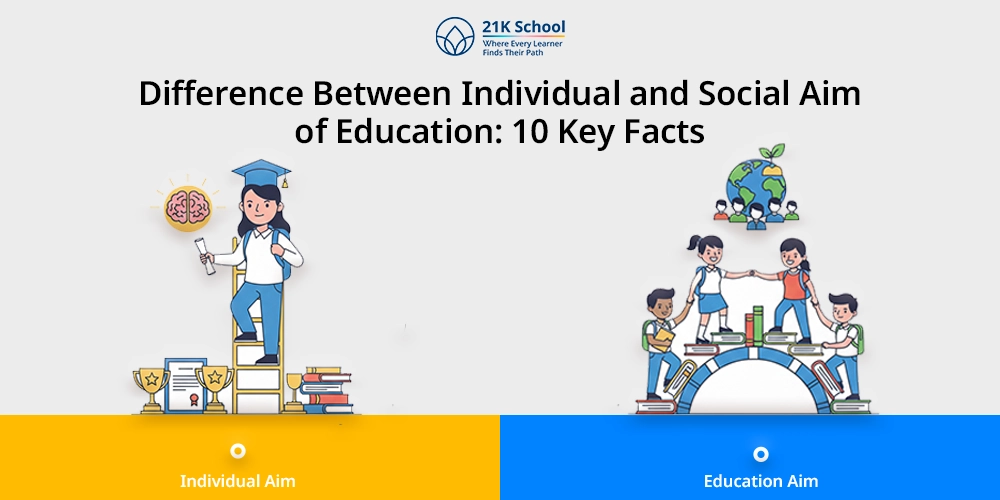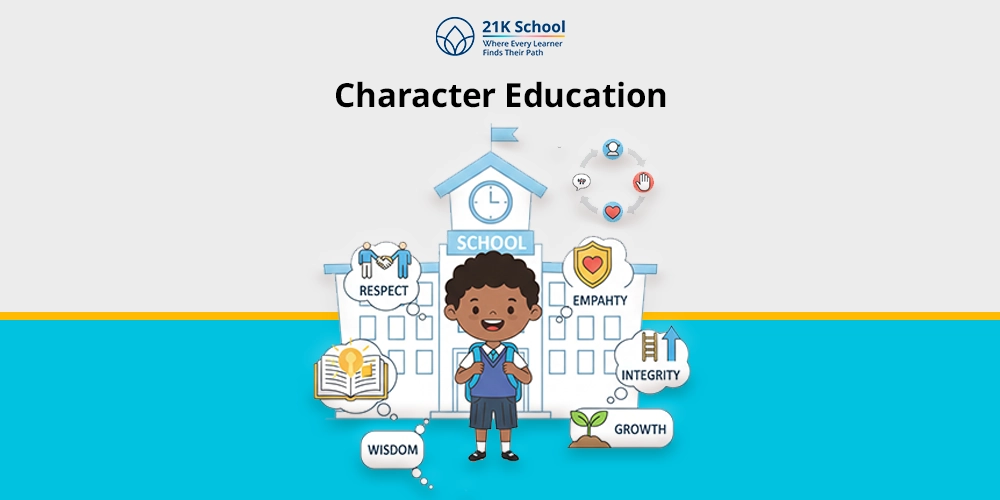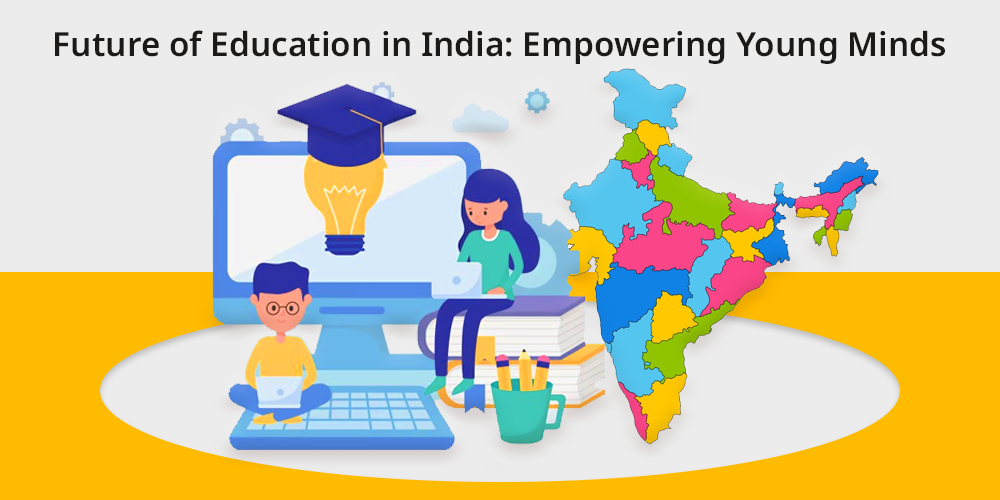
With time, education in India has evolved and worked towards better opportunities. From e-learning for kids to benefits of online schools for teachers.
The growing youth population and rich heritage of knowledge the country is filled with innovative minds. This technological advancement creates a difference in students’ lives.
The future of education in India consists of innovation, inclusivity, accessibility, and adaptability. The main objective is literacy and holistic development.
This provides creativity, critical thinking skills, problem-solving, and lifelong learning. Let’s explore the future of Indian education, how it is reshaping, and the vision of 2040.
Contents
- Key Points Shaping the Future of Education in India
- 1. Online Schooling
- 2. Hybrid Learning Models
- 3. Inclusive Education
- 4. Personalized Learning
- 5. Rise of AI in Education
- 6. Augmented Reality (AR)
- 7. Digital Transformation
- 8. Technology Integration
- 9. Critical Thinking and Problem-Solving
- 10. Skill-Based Education
- 11. Lifelong Learning
- 12. Holistic Learning
- 13. National Education Policy (NEP) 2020
- 14. Increased Access to Higher Education
- 15. Focus on STEM Education
- 16. Internationalization of Higher Education
- Key Pillars of Future Education in India
- The Role of Stakeholders
- Technological Innovations and Online Schooling
- Vision for 2040 and Beyond
- Conclusion: Smart Learning for a Smarter India
Key Points Shaping the Future of Education in India
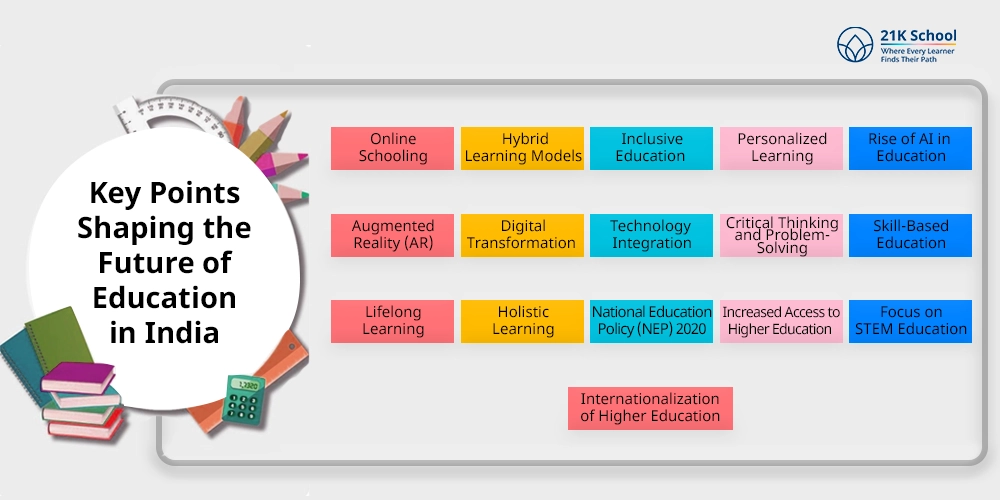
The future of Indian education is being shaped by several key factors such as personalized learning, early childhood education, technology integration etc.
Let’s understand each point in detail:
1. Online Schooling
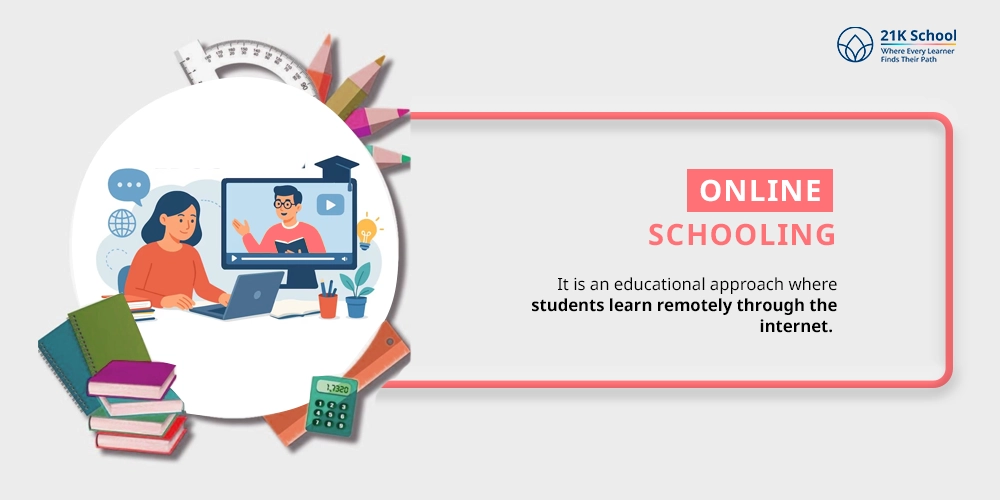
Online schooling is also known as distance or virtual learning. It is an educational approach where students learn remotely through the internet.
For example, online primary school secure students’ futures which offers flexibility and accessibility, allowing students to learn at their own pace.
It is ideal for increased access to quality education for underserved populations, greater flexibility for learners, and the potential for personalized learning experiences.
2. Hybrid Learning Models
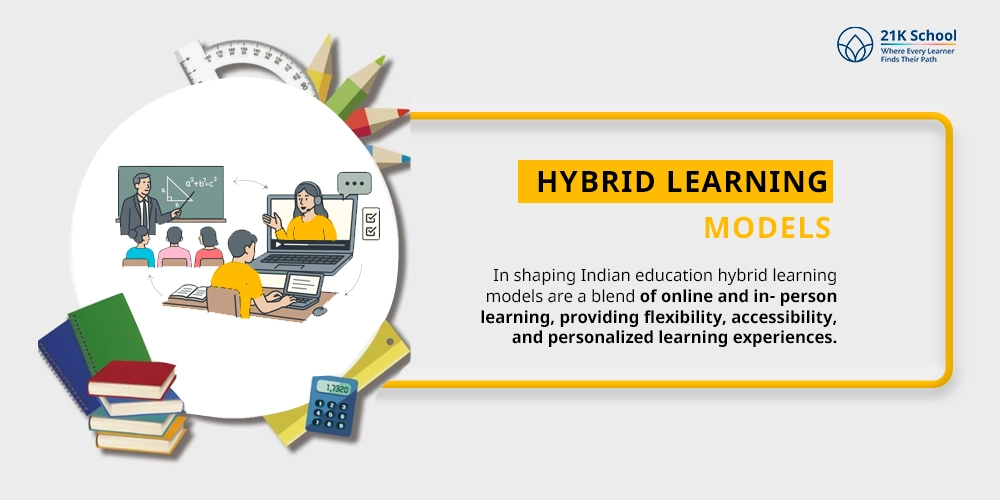
In shaping Indian education hybrid learning models are a blend of online and in-person learning, providing flexibility, accessibility, and personalized learning experiences.
This method not only helps in continuous learning, even during disruptions, and encourages a mix of self-paced learning and classroom collaboration.
Hybrid learning programs such as individualized rotation, flipped classroom are the examples of hybrid learning.
3. Inclusive Education
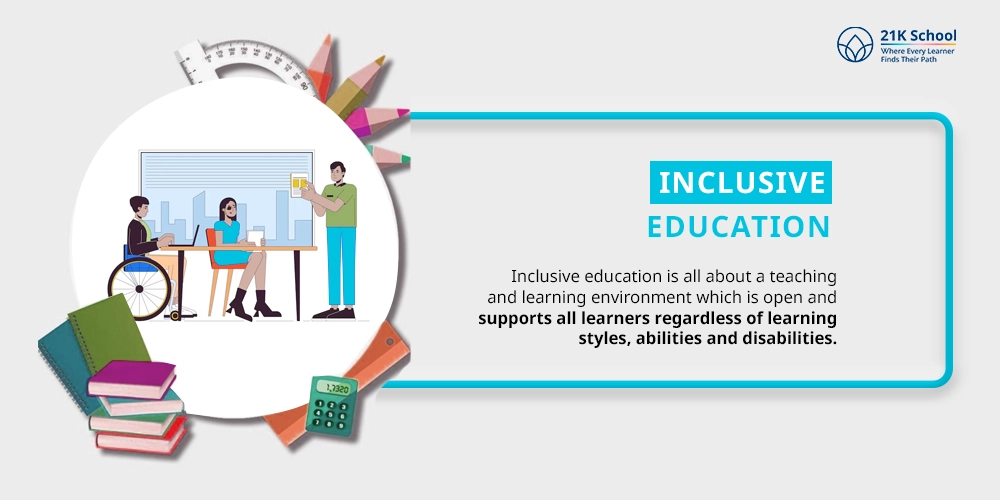
Inclusive education is all about a teaching and learning environment which is open and supports all learners regardless of learning styles, abilities and disabilities.
It provides acceptance and diversity, enhancing students’ interaction and social skills, and improving academic performance for all students, including special needs students.
4. Personalized Learning
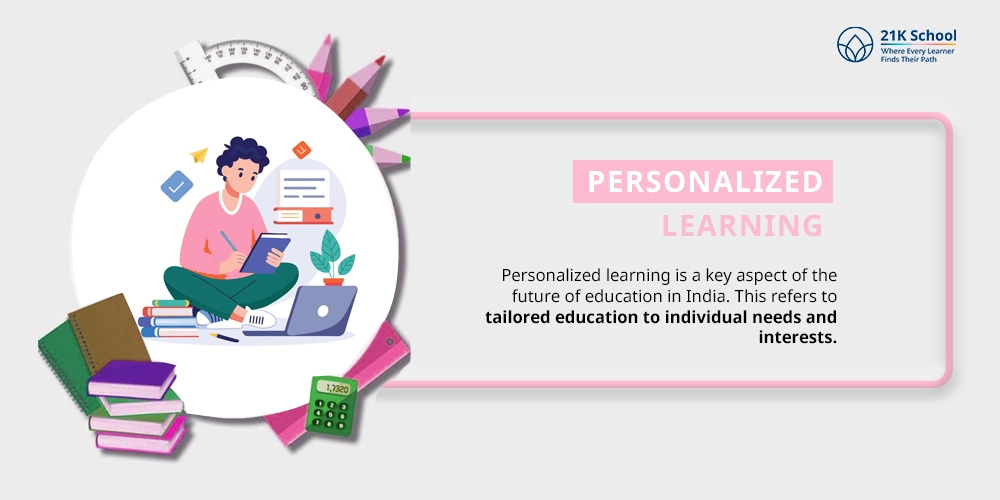
Personalized learning is a key aspect of the future of education in India. This refers to tailored education to individual needs and interests.
The benefits of personalized learning and the future of education provides customized learning experiences, leveraging technology and AI. This will enhance the end outcome.
5. Rise of AI in Education
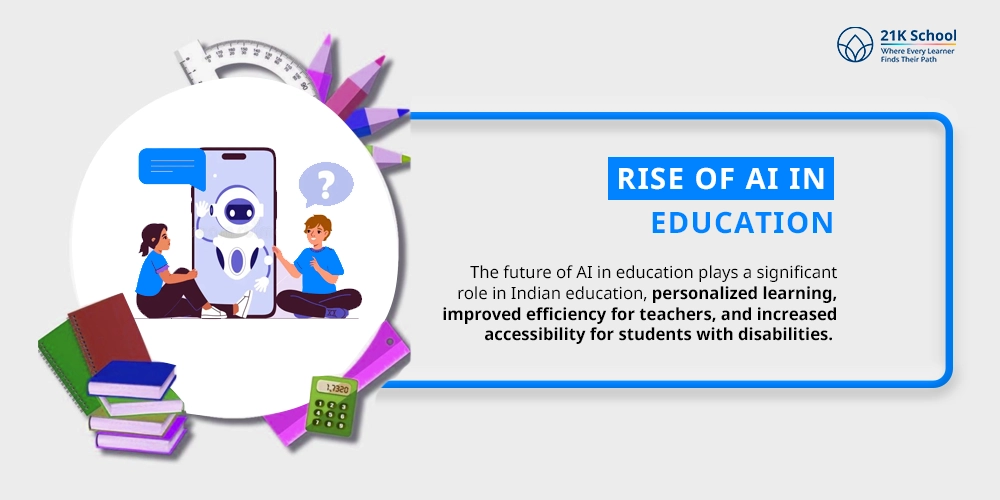
The future of AI in education plays a significant role in Indian education, personalized learning, improved efficiency for teachers, and increased accessibility for students with disabilities.
Online schools like 21K school offer AI based intelligent tutoring systems, predictive analytics, grading automation, and smart content delivery.
These help in identifying learning gaps and offer real-time solutions to get desired results.
6. Augmented Reality (AR)
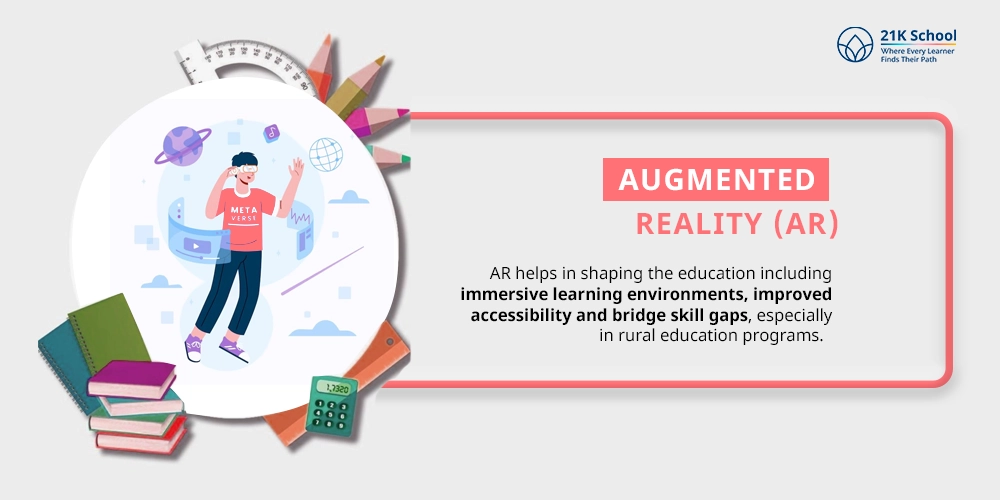
Augmented reality or AR is a revolutionary technology that is shaping this future in a better way. It helps in making difficult concepts easier to understand.
AR helps in shaping the education including immersive learning environments, improved accessibility and bridge skill gaps, especially in rural education programs.
7. Digital Transformation
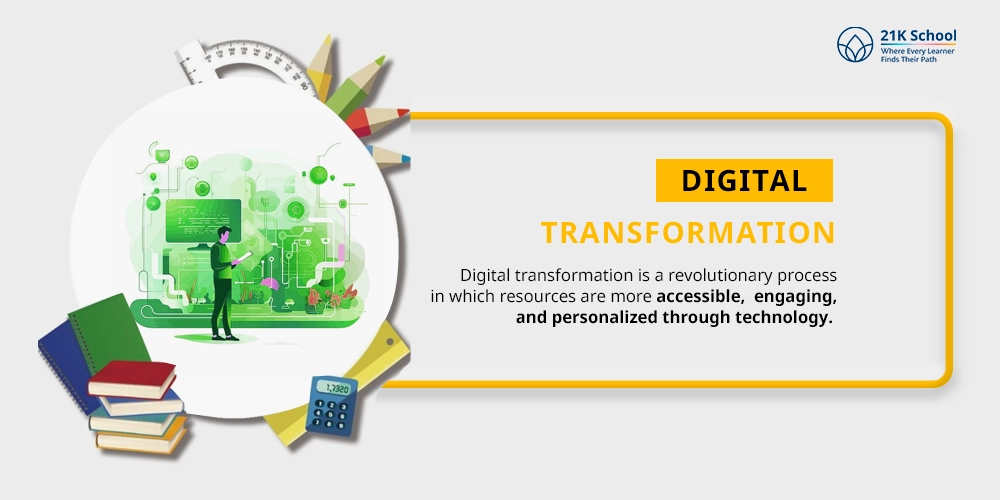
Digital transformation is a revolutionary process in which resources are more accessible, engaging, and personalized through technology.
It is majorly used for improved accessibility, enhanced engagement, remote learning, personalized learning, and the development of digital literacy.
8. Technology Integration
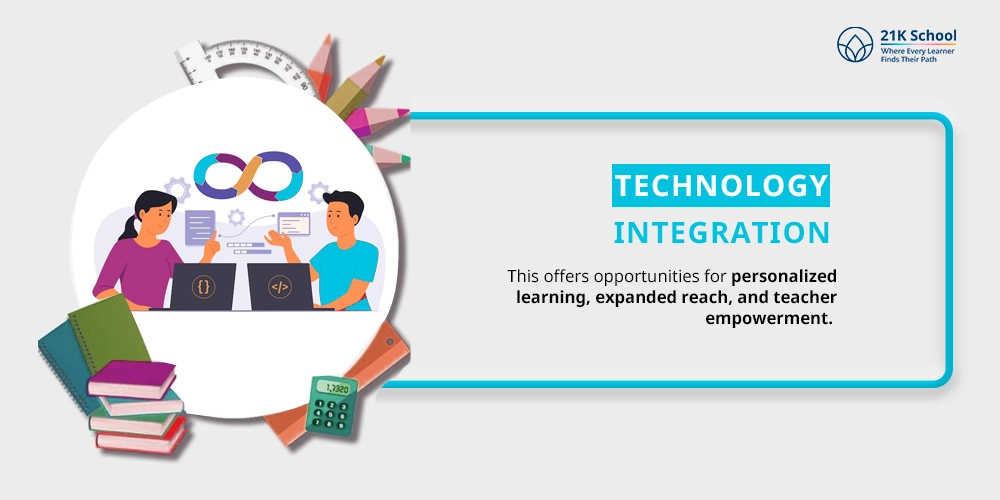
The future of education in India has key considerations for technology integration. This offers opportunities for personalized learning, expanded reach, and teacher empowerment.
However, students and teachers need to cope up with various challenges such as digital divide and resistance to change.
But with time schools like 21K school offer lots of solutions and opportunities like student teacher communication for smooth integration. The contribution of technology in education makes learning easy and creative.
9. Critical Thinking and Problem-Solving
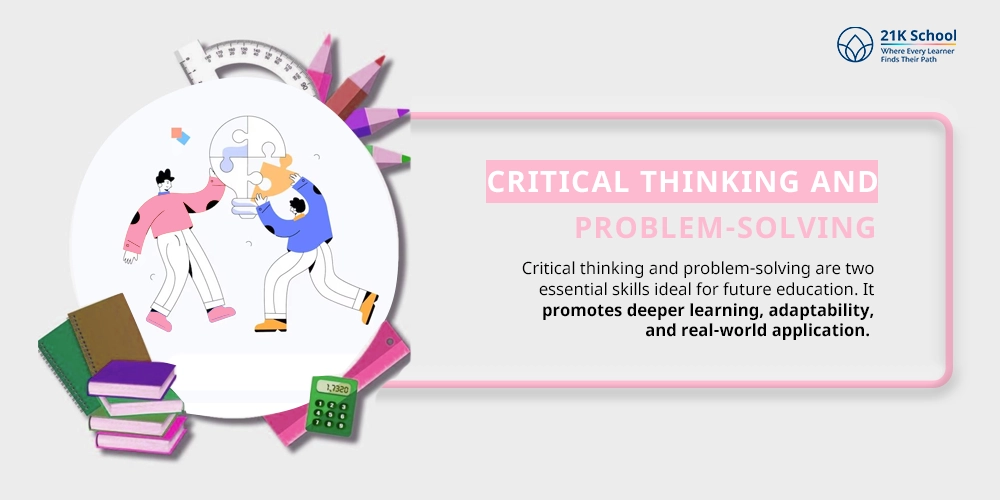
Critical thinking and problem-solving are two essential skills ideal for future education. It promotes deeper learning, adaptability, and real-world application.
These skills not only help students in thinking innovative approaches but also find unique and better solutions.
To improve these skills parents must read critical-thinking activities for kids.
10. Skill-Based Education
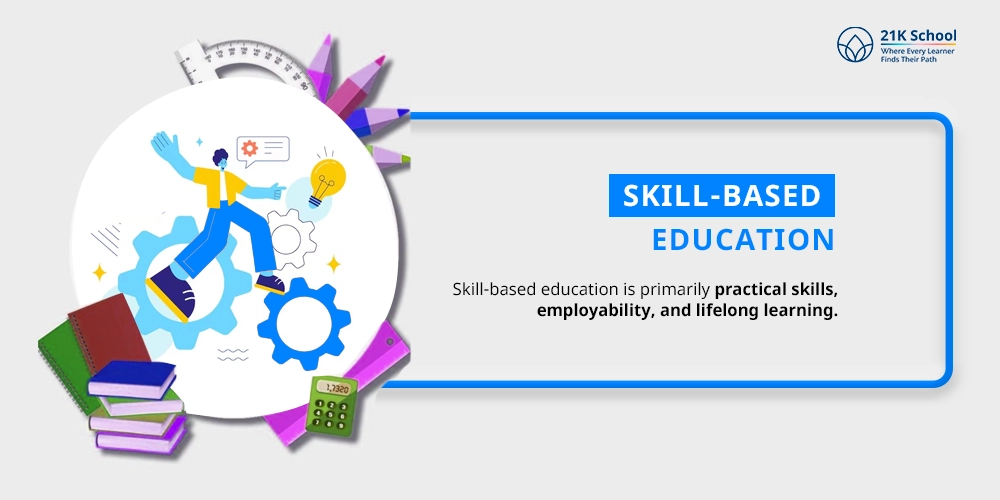
Skill-based education is primarily practical skills, employability, and lifelong learning. This helps students in bridging the gap between learning and employability.
Skill-based education includes integration of vocational training, emphasis on digital literacy and emerging technologies. It further supports entrepreneurship.
11. Lifelong Learning
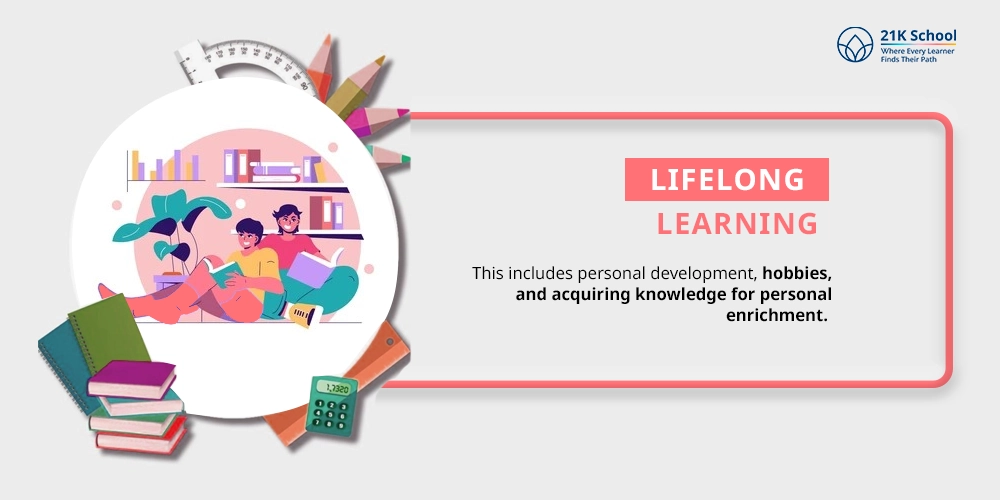
In this changing world lifelong learning means continuous learning includes a broader range of educational experiences.
This includes personal development, hobbies, and acquiring knowledge for personal enrichment.
Lifelong learning priorities digital literacy, personalized learning, and a more flexible education system that integrates online and offline learning.
12. Holistic Learning
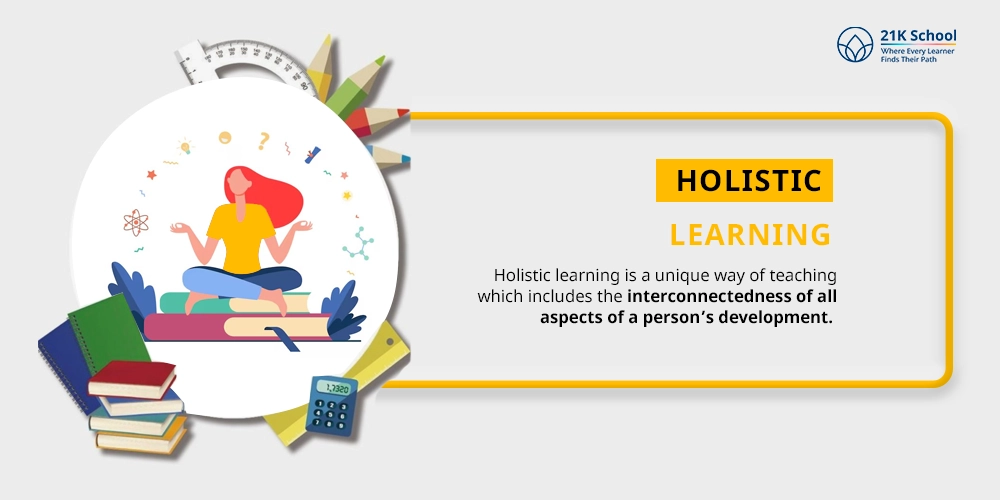
Holistic learning is a unique way of teaching which includes the interconnectedness of all aspects of a person’s development. It includes intellectual, emotional, social, physical, and spiritual.
Its main focus is shifting towards all-round development from Arts, sports, mindfulness activities to National Curriculum Framework development.
13. National Education Policy (NEP) 2020
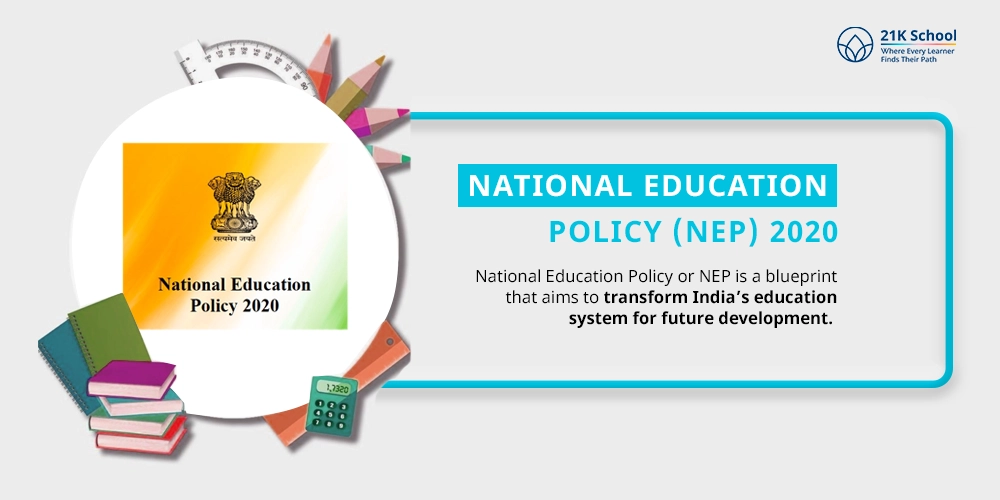
National Education Policy or NEP is a blueprint that aims to transform India’s education system for future development.
This includes a new school structure (5+3+3+4), flexible curricula, multilingual education, technology integration, and reforms in higher education.
14. Increased Access to Higher Education
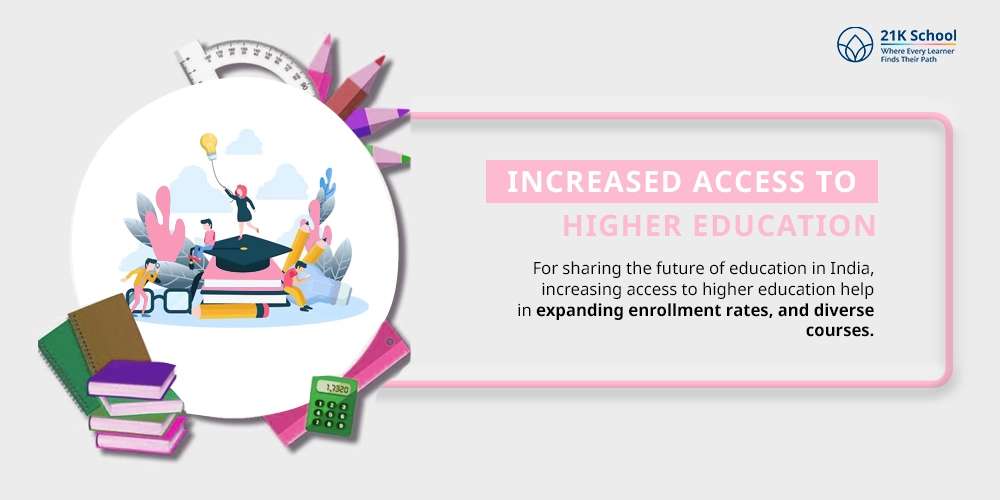
For sharing the future of education in India, increasing access to higher education helps in expanding enrollment rates, and diverse courses. It further improves infrastructure while promoting vocational education etc.
NEP also aims to transform the education system, focusing on multidisciplinary education, technology integration, flexibility in curriculum and others.
15. Focus on STEM Education
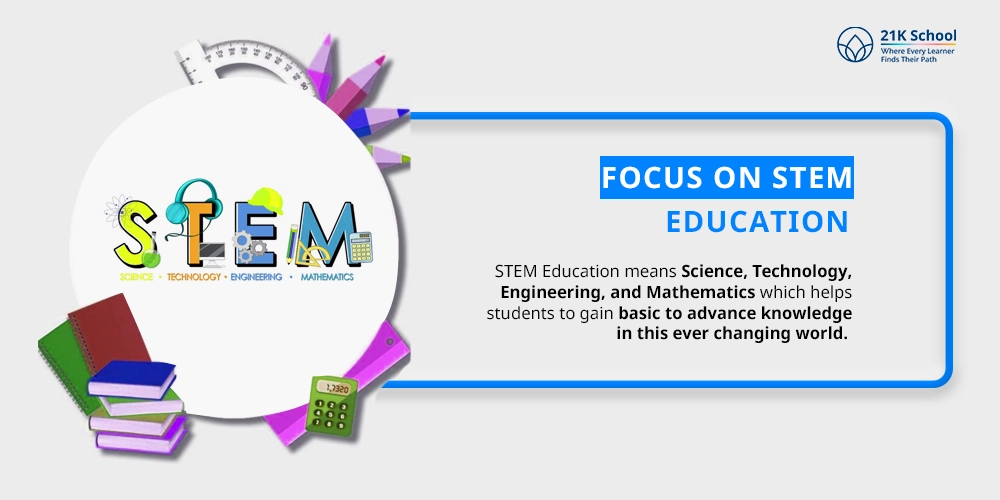
STEM Education means Science, Technology, Engineering, and Mathematics which helps students to gain basic to advance knowledge in this ever changing world.
It fosters critical thinking and problem-solving abilities, preparing students for future careers, and integrating technology and innovation into the curriculum.
16. Internationalization of Higher Education
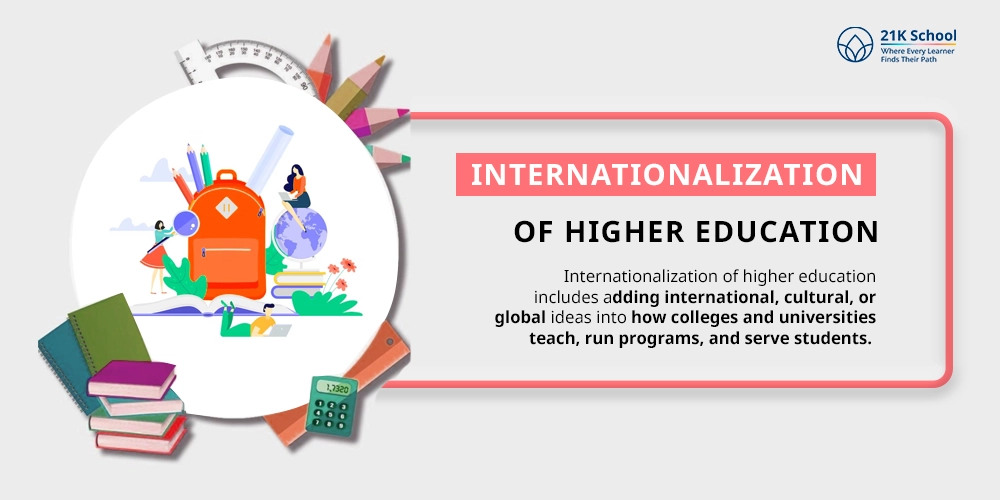
Internationalization of higher education includes adding international, cultural, or global ideas into how colleges and universities teach, run programs, and serve students.
This is all about helping students and staff learn and work in ways that connect them to the wider world.
This can be done by global collaborations, improving academic quality, attracting international students and faculty, and aligning with global standards to enhance research and innovation capabilities.
Key Pillars of Future Education in India
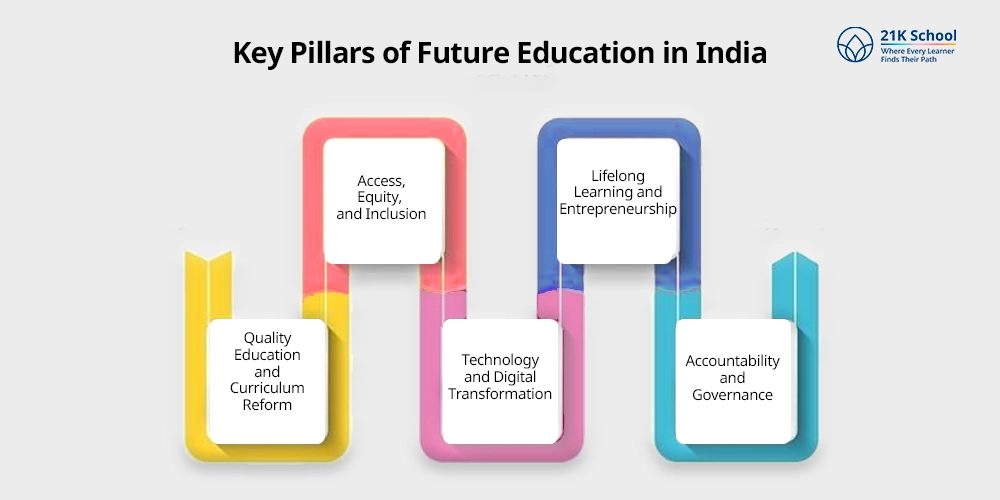
There are some essential key pillars of future education in India. Let’s explore each:
- Quality Education and Curriculum Reform
For future education in India quality education and curriculum reforms are the foundation stone for a skilled and knowledgeable workforce.
To meet the demands, it focuses on conceptual understanding, experiential learning, and competency-based education.
This ensures students not only learn but can apply their knowledge effectively in real-life situations, especially in jobs.
- Access, Equity, and Inclusion
Access, equity, and inclusion are the foundation principles of having a successful future in Indian education. It is based on the National Education Policy (NEP) 2020.
Access, equity, and inclusion ensure that everyone gets a quality education from girls, special needs students to kids from rural communities.
Not only education they also need scholarships, infrastructure, and digital access to concur the future world.
- Technology and Digital Transformation
Technology and digital transformation are key to success in education. It is crucial to enabling personalized learning, wider access, and skill development.
Digital tools, smart classrooms, AI-powered assessments, and many more are used by online platforms to meet the needs of future education in India.
- Lifelong Learning and Entrepreneurship
One of the crucial pillars of education in India is lifelong learning and entrepreneurship. It encourages entrepreneurship, innovation and continuous learning in students.
These pillars align with four things, Learning to Know, Learning to Do, Learning to Live Together, and Learning to Be.
- Accountability and Governance
Accountability and good governance is important for an effective education pillar. Technology can track learning outcomes, teacher performance, and resource utilization to ensure accountability at every level.
The Role of Stakeholders
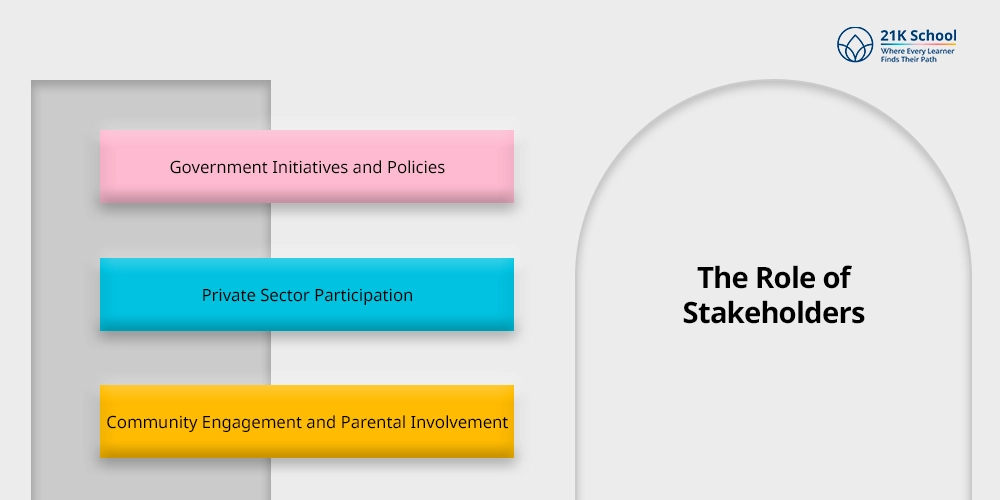
Stakeholders play crucial roles in the future and success of education in India. Here’s what you need to know about stakeholders:
1. Government Initiatives and Policies
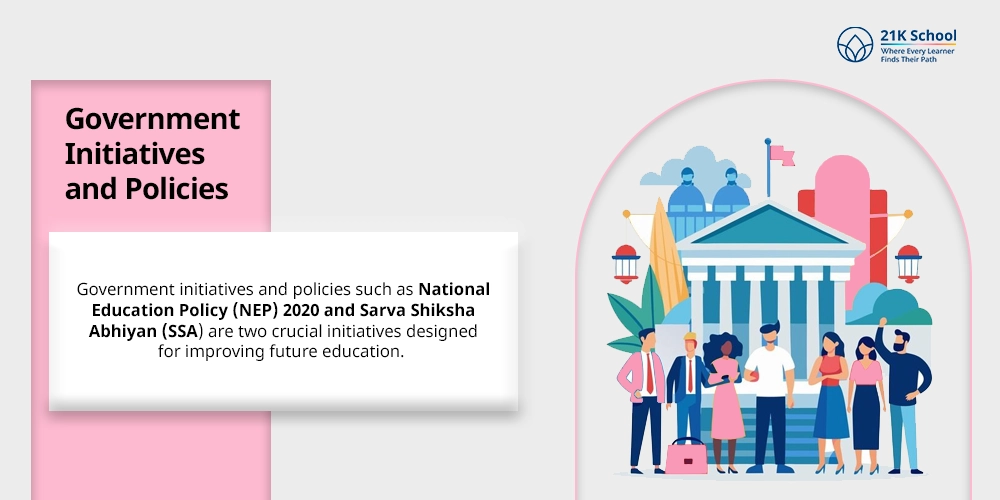
Government initiatives and policies such as National Education Policy (NEP) 2020 and Sarva Shiksha Abhiyan (SSA) are two crucial initiatives designed for improving future education.
It promotes equity, quality, and lifelong learning for each student. Collaborations with states and integration of emerging technologies in curriculum frameworks are crucial for wide-scale transformation.
2. Private Sector Participation
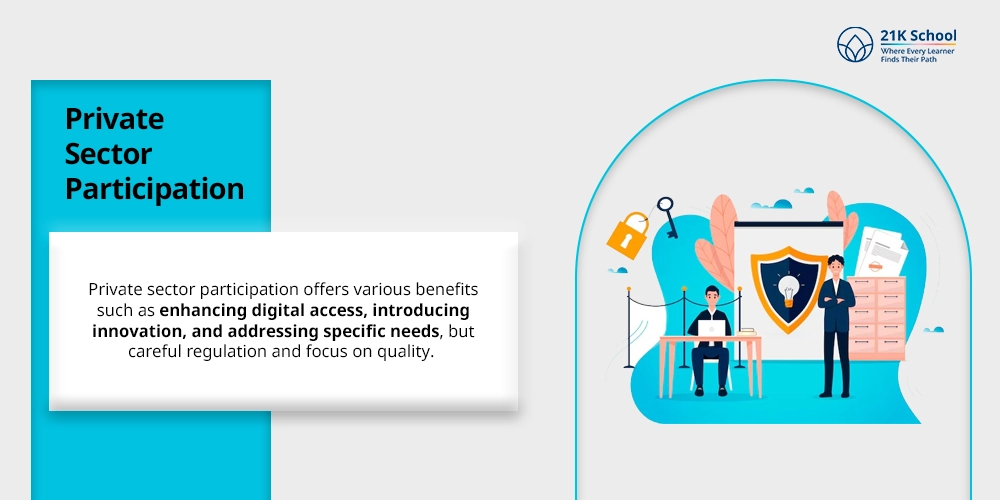
Private sector participation offers various benefits such as enhancing digital access, introducing innovation, and addressing specific needs, but careful regulation and focus on quality.
For example, various Edtech startups, private universities, and CSR initiatives from organizations take part to improve students’ learning.
3. Community Engagement and Parental Involvement
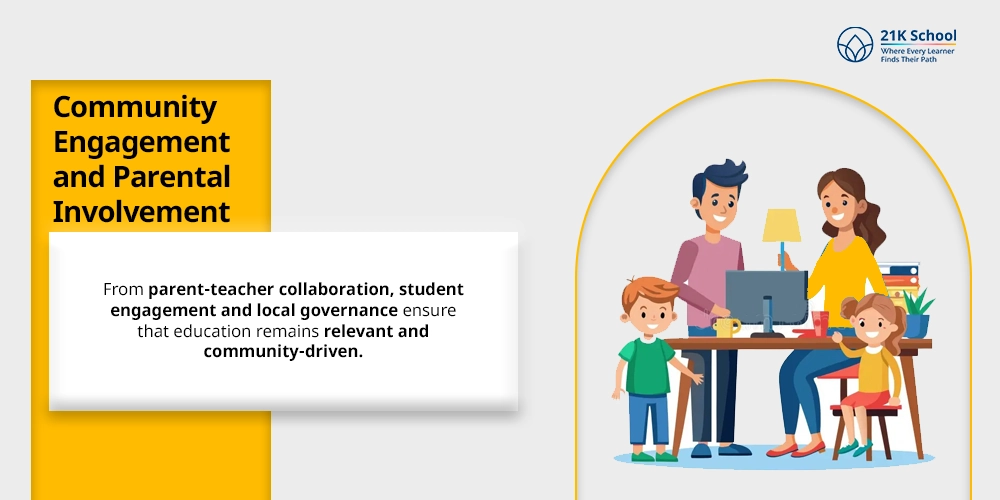
For the successful educational results community engagement and parental involvement are important.
From parent-teacher collaboration, student engagement and local governance ensure that education remains relevant and community-driven.
The journey of education is not limited to children, it also needs parents and teachers’ involvement for overall good educational experience.
Technological Innovations and Online Schooling
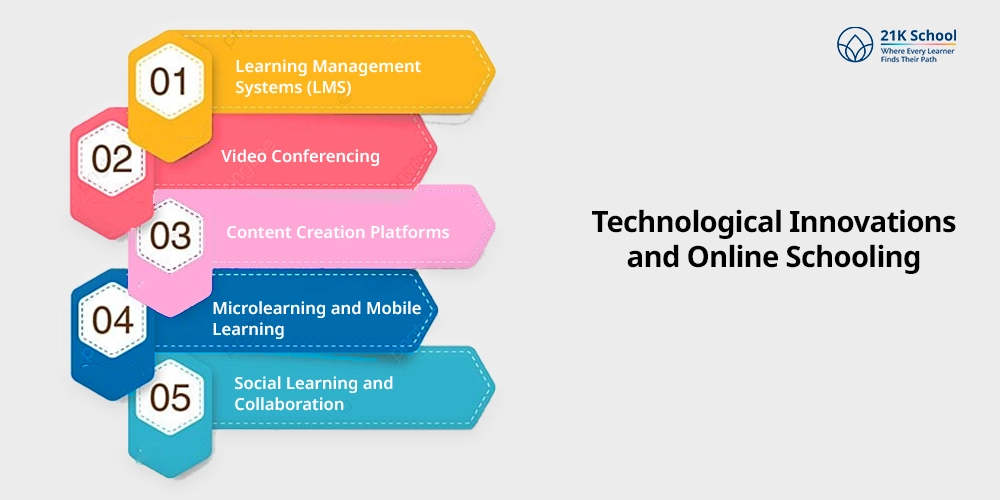
Technological innovations and online schooling is a blended learning that helps in shaping the future of education.
Here’s the key trends shaping the future:
- Learning Management Systems (LMS):
Learning Management Systems is a software application used to manage and deliver online learning and training programs.
It provides benefits to future education such as personalized learning, accessibility, and data-driven insights.
- Video Conferencing:
Video conferencing tools like Zoom, Microsoft Teams, and Google Meet have become integral to virtual classrooms.
Online schools such as 21K School offer live sessions, breakout rooms, and interactive whiteboards to make learning more collaborative and engaging.
- Content Creation Platforms:
Content creation platforms allow teachers and students to create interactive learning experiences. This shift from passive consumption to active creation builds critical and digital skills.
These platforms align with emerging technologies like AI, VR, and AR to shape the future of education.
- Microlearning and Mobile Learning:
Online schooling offers microlearning and mobile learning to revolutionize education. Microlearning means bite-size content which is easy to remember and understand.
Mobile learning refers to flexible learning options with smartphones and tablets for flexible access. Now students can opt for modern education without any disturbance.
- Social Learning and Collaboration:
Social platforms and forums foster collaborative learning. Peer-to-peer interactions, group projects, and online discussions build teamwork and communication skills essential for the modern workplace.
Vision for 2040 and Beyond
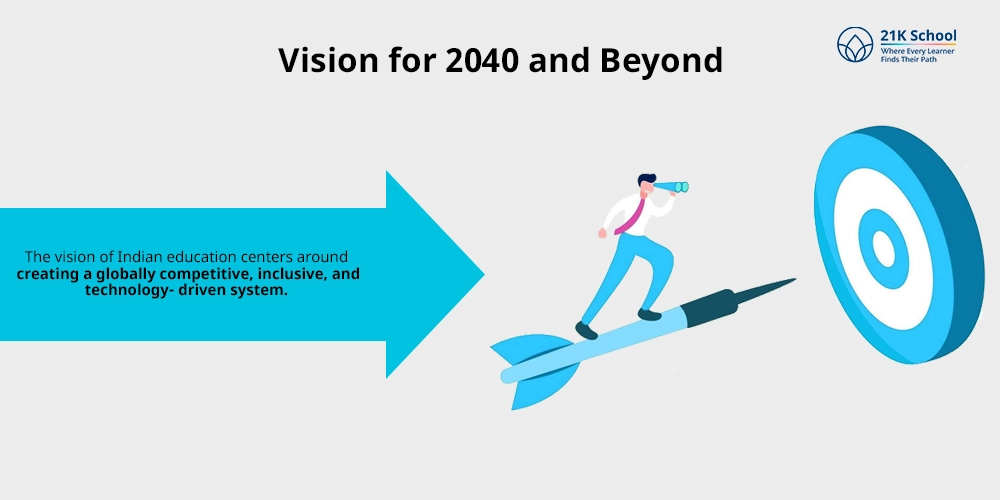
The vision of Indian education centers around creating a globally competitive, inclusive, and technology-driven system.
The upcoming change helps in access to high-quality education for all, fostering holistic development, and equipping individuals with the skills and knowledge.
Some key pillars of the future education consist of holistic development, skill-based learning, interdisciplinary approaches etc.
By embracing small changes India can create an indian education system that prepares its youth to become successful and innovative.
At 21K school we ensure students, teachers and parents get the right environment to meet the future demand. Let us educate not just to inform, but to transform.
Conclusion: Smart Learning for a Smarter India
The future of education in India holds immense promise. A digitally connected, inclusive, and innovative system can truly empower the nation’s young minds.
By embracing change and fostering collaboration between government, private sector, educators, and communities, the Indian education system is ready for the challenges of tomorrow.
Remember, smart learning is not just about technology. It’s about nurturing smart thinkers, compassionate citizens, and responsible innovators.
As we journey toward 2040 and beyond, everyone’s dream is clear: an India where every kid has the opportunity, tools, and guidance to reach their full potential.

